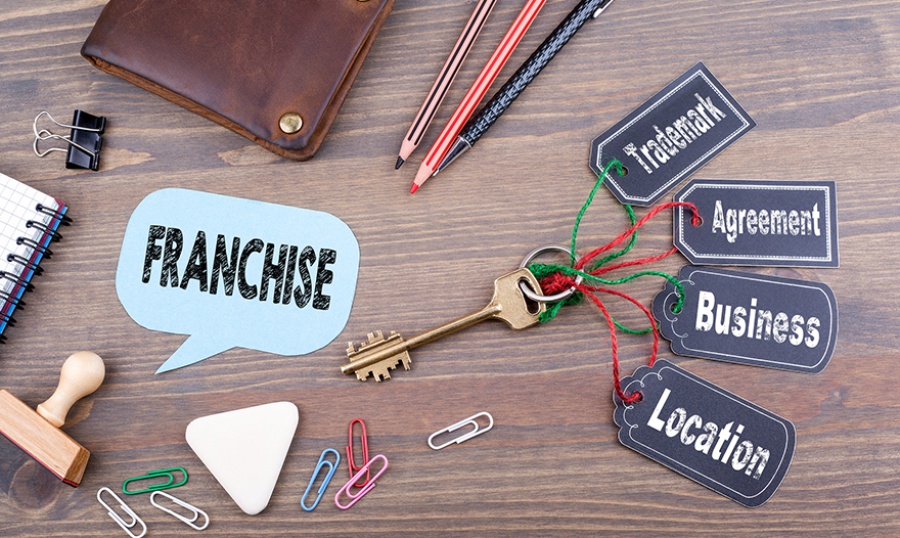
🕒 Estimated reading time: 7 min.
2018 has been a very busy year for the UK franchise industry. For our November guest article, Jamie Roberts from MediaWorks has rounded up a few of the top performing franchises in the UK.
Franchises are popping up all over the place and really, that’s the whole point of them. It doesn’t matter what industry you want to get into, there will be a franchise for you. In fact, currently over 120 industries in the UK have franchised companies. Usually, the franchisee receives help with their site selection and development support, quality control, training and brand standards. They also receive business advisory support from the franchisor.
Below, we take a look at a few of the top franchises in the UK:
Papa John’s
History
John Schnatter, founder of Papa John’s, baked his first pizzas in 1972 at his father’s tavern, Mick’s Lounge, in Indiana. At the time, the tavern was on the verge of bankruptcy, so Schnatter junior sold his 1972 Camaro Z28 to raise enough funds to keep the establishment afloat. He decided to knock down the establishment’s broom closet, purchased used restaurant equipment and started to deliver pizzas from the back of the bar.
Since then, he’s gone by the motto of: "Bake a better pizza and the world will beat a path to your door." In 1985, Schnatter opened his first Papa John’s restaurant in Jeffersonville and within seven years, he had sold the franchise to help it grow to 100 restaurants. The growth did not stop there, either. Between 1993 and 1999, the company offered shares to the public and triggered a period of rapid growth.
Understanding the importance of staying with the current time, Papa John’s noticed the importance of the internet and launched online ordering in 2001. By 2015, there were 300 UK stores, and 2017 saw the launch of Papatalk – an interactive way for customers to feedback on their experience.
Key Business Features
- Stay fresh: Papa John’s knows the importance of quality ingredients in maintaining their customers. As well as this, they understand the need to move seamlessly along with technology, introducing new features as technology has advanced.

Wetherspoons
History
The first Wetherspoons was initially called Martin’s Free House and was opened in a former bookmakers store in 1979 in North London. It changed its name to Wetherspoons the following year, and the company’s chains initially only expanded in North London. The company opened its first pub which had a no-smoking bar in 1991 in North Finchley, before moving more into Central London, with their first pub in Liverpool Street Station. The following year, the first airport pub was opened in Heathrow and in the same year they were also named J D Wetherspoon plc, opening their 50th pub.
When things continued to move quickly, the brand decided to move out of London in 1993 and they began opening venues in Bracknell and Norwich. By 1994, the chain had reached an impressive 100 pubs and ventured as far north as the Midlands. The business kept expanding and moving into new territories throughout the 1990s, with further establishments opened in Manchester, Wales and Scotland. 1998 saw the 300th pub open and its rapid expansion saw them reach 500 pubs being open by 2001. The 600-mark was reached in 2002, as the breakfast revolution got underway and all pubs opened six days a week to serve the first meal of the day.
It’s crucial to adapt to change and the company proved they were able to do so when they included free Wi-Fi in all of their pubs. By 2007, the first wedding was held, and the company launched its 700th pub in 2008, with the 800th following in 2011 and 900th in 2013. Nowadays, the company employs over 35,000 staff, and owns 948 pubs and hotels.
Key Business Features
- Key travel locations: the chain knows location is crucial and positions its venues in key travel spots such as train stations and airports. You can currently find them in Aberdeen, Birmingham International, Doncaster, Edinburgh, Liverpool John Lennon, Heathrow, Gatwick, Glasgow and Stansted airports, and near train stations around London, Leeds, Liverpool and Glasgow.
- Festival spirit: Wetherspoons make sure they embrace the festival spirit. They currently are involved in a biannual beer festival with 60 beers on tap.
- Meal deals: us Brits love a deal and Wetherspoon take advantage of this by advertising a host of great meal deals. They include the initial Curry Club and Steak Club, Chicken Club, Fish Friday and Sunday Brunch and offer a drink alongside them.
What can businesses learn from Wetherspoons?
What we can learn from Wetherspoons is that location is essential and so is tapping into the market with enticing offers. Wetherspoons have succeeded most by being flexible and adapting to their environment.

Greggs
History
In 1930s Newcastle, a man called John Gregg began a delivery service and delivered eggs and yeast to families on his pushbike. It was after having this delivery service, which enabled local families to bake their own bread for over 10 years, that John Gregg opened a small bakery on Gosforth High Street in 1951. It was a single shop with a bakery at the rear. This allowed Greggs to begin baking quality bread with flour that was milled from specially selected wheat for that distinctive Greggs taste and texture.
Ian Gregg took the reins of the family business in 1964, following the death of his father. Under Ian's leadership, Greggs developed a good reputation for selling products which were high-quality and of great value. The company also started to grow in size by buying regional bakery retailers across the United Kingdom and, by the 1970s, they had shops in Scotland, Yorkshire and the North West.
By 1984, the company was hugely expanding; there were more than 260 shops in four areas of the country. For the first time ever, Greggs was on the Stock Exchange and they continued to expand, opening shops in the Midlands, Wales and North London. By investing in a large technical centre, the company was able to focus on developing an array of new recipes while improving old favourites. This highlights that Greggs continued its rapid growth during the noughties.
Key Business Features
Keep it local: with almost 1,700 stores nationwide, Greggs has always remained rooted in their local communities. That means that, while there is the popular national range, regional favourites can be found in their stores depending on where you are.
Lookers Group
History
In Manchester in 1908, John Looker founded the company. By 1910, the business had forged with a garage owner in the centre of Manchester. Primarily a Ford dealer until the First World War, the company was thriving so much that the garage had to be rebuilt in 1911 to accommodate all the business that it had generated.
In 1918 after being appointed a distributor of Austin motor vehicles, the company continued growing by acquiring garages in Lancashire and Cheshire. John Looker retired in 1929, but the business didn’t falter. During the Second World War, the Austin factory was committed to the war effort as the country fought. Fast forward a few decades and the business’s first major acquisition took place in the 60s when the group moved into Yorkshire. By 1973, their headquarters had moved from Hardman Street to Chester Road, which is their current base today. At the same time, the company became a listed company on the London Stock Exchange.
Nowadays, Lookers is in the top three motor vehicle retailers in the UK and offers a range of servicing offers. It also represents 32 manufacturers at 150 franchised dealerships.
Key Business Features
- Value your people: it’s essential to look after your staff if you want to be a success. The Group knows this and received top employer UK 2017 and 2018 accreditations. By acquiring several local businesses, including Benfield, the Group understood the need to keep the local feel of the businesses while softly implementing their own touch.

Success in the Franchise Industry
Of course, these are just four examples of successful franchises. It’s clear that the franchise world is going to continue growing, regardless of the industry you choose. By providing you with a ready-made business model and allowing you to keep your skills sharp while joining an already thriving business, you may feel as though you have a greater chance of success.
So, budding franchisees out there, make sure you research any possible franchises that could be of interest to you before jumping in feet first with your idea!
Browse the latest franchise opportunities on the Franchise Direct UK site right here.














